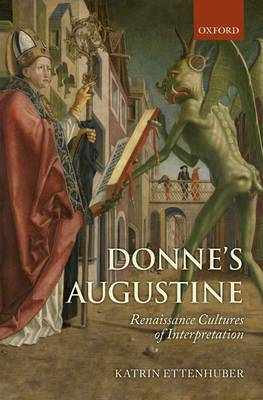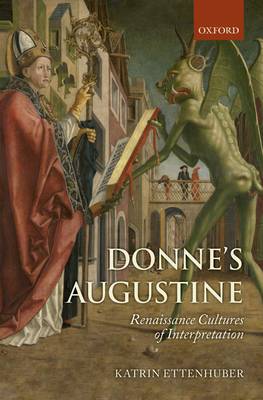
En raison d'une grêve chez bpost, votre commande pourrait être retardée. Vous avez besoin d’un livre rapidement ? Nos magasins vous accueillent à bras ouverts !
- Retrait gratuit dans votre magasin Club
- 7.000.000 titres dans notre catalogue
- Payer en toute sécurité
- Toujours un magasin près de chez vous
En raison de la grêve chez bpost, votre commande pourrait être retardée. Vous avez besoin d’un livre rapidement ? Nos magasins vous accueillent à bras ouverts !
- Retrait gratuit dans votre magasin Club
- 7.000.0000 titres dans notre catalogue
- Payer en toute sécurité
- Toujours un magasin près de chez vous
273,95 €
+ 547 points
Description
The poet and preacher John Donne (1572-1631) was one of the most influential authors of early modern England. Donne's Augustine examines his response to an iconic figure in the history of Western religious thought: Saint Augustine of Hippo (354-430). Katrin Ettenhuber argues that Renaissance culture saw not only a revival of the classics, but was equally indebted to the intellectual and literary legacy of the Church Fathers. The study recovers an Augustinian tradition of interpretation which permeated the religious world of the period, but which has until now been largely overlooked. She presents a comprehensive re-evaluation of Donne's writings, ranging from the poems to less familiar prose works, situates him carefully in the poetic, intellectual, and political contexts which frame his works, and engages with recent developments in both literary and historical studies. Donne's Augustine is the first sustained study of Donne's reading practices, and of the theological sources which shaped his thought. It discovers a range of medieval and early modern texts which transformed the imagination of literary writers in the period but which have been neglected so far: devotional manuals, Scripture commentaries, and religious commonplace books (often in Latin). The study pays close attention to the intellectual and political conditions which informed the reception of Augustine's works, and offers detailed readings of Donne's texts which illuminate the literary aspects of his patristic heritage. Donne's Augustine makes a significant contribution to our understanding of the larger reading and writing culture of Renaissance England, and of the religious debates and controversies in the decades leading up to the Civil War.
Spécifications
Parties prenantes
- Auteur(s) :
- Editeur:
Contenu
- Nombre de pages :
- 288
- Langue:
- Anglais
Caractéristiques
- EAN:
- 9780199609109
- Date de parution :
- 02-09-11
- Format:
- Livre relié
- Format numérique:
- Genaaid
- Dimensions :
- 157 mm x 234 mm
- Poids :
- 539 g

Les avis
Nous publions uniquement les avis qui respectent les conditions requises. Consultez nos conditions pour les avis.






